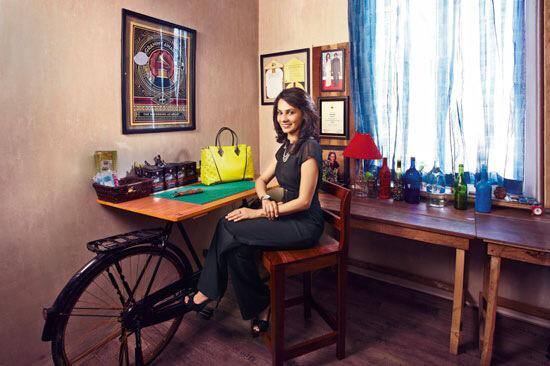Tanvi Shah is a popular Indian playback singer who sings in multiple languages. She is the unseen voice behind the foot-tapping chart-busters that have set millions rocking. She shared the Grammy Award for Best Song Written for Visual Media with A.R. Rahman and Gulzar in the 52nd Grammy Awards for the song Jai Ho, for writing the Spanish lyrics for the song. She can’t live without Google maps and is currently writing her own songs and collaborating with JHawk.
Tell us a bit more about yourself and what you do? When did you start singing and how did you get your first break?
I am basically a designer. I studied Fine Arts and then got my Ceramics degree from George Washington University. I was all focused on design and art and singing was never in the plan of action. In college we used to sing for fun in small groups and do karaoke tracks with friends. That was the maximum I did in terms of singing. It just so happened that I got back from the US in 2003 and someone went and gave my karaoke recording to A.R. Rahman. And then the rest is history. I didn’t believe it because I am not a trained singer. My training in music started only after my first song. I started training in my late 20s actually. There’s been no looking back since then. I was really shocked because you don’t just get a call from someone like A.R. Rahman. I thought someone was pulling a prank on me.
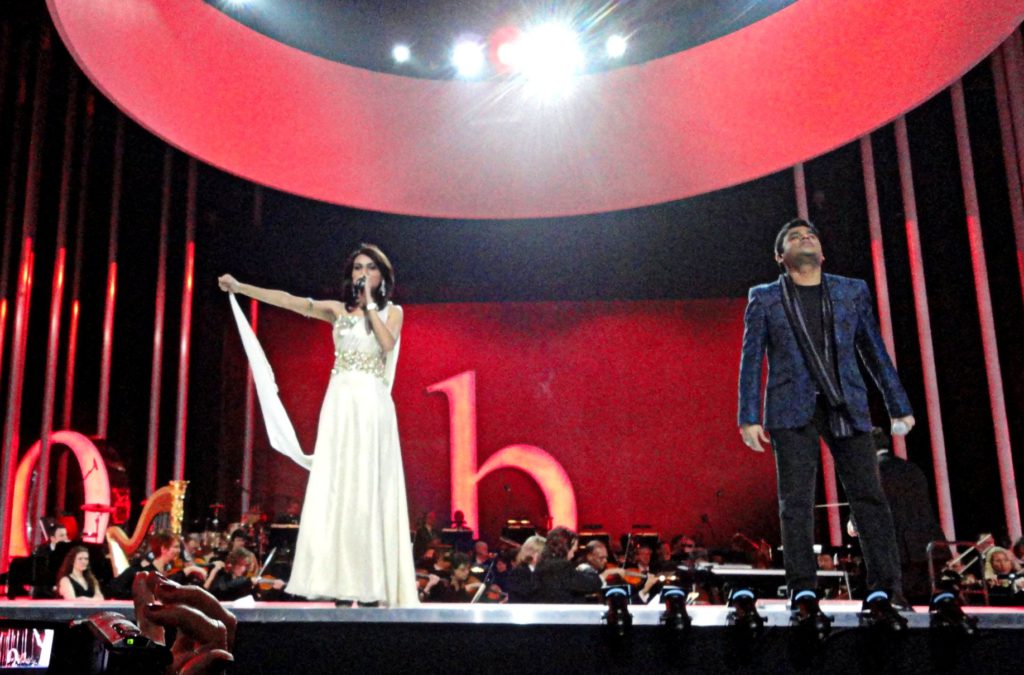
Tanvi with A.R. Rahman
The first song that I got was from Mani Ratnam’s movie, Yuva. I just felt it was a blessing. You shouldn’t disrespect it when something is thrown at you like that. So I just took it up and I have been singing since then. May 13th, 2003 to be precise.
Do you have anyone in your family who is from a musical background?
My mum was a sitarist. She never performed professionally. I was told she used to play really well before I was born. We used to play antakshari at home for fun. That was all the music we had. There was no plan of action. There was no feeling like ‘’Oh my God, I have to become a singer.’’ But I would never forget 13th May 2003 ever.
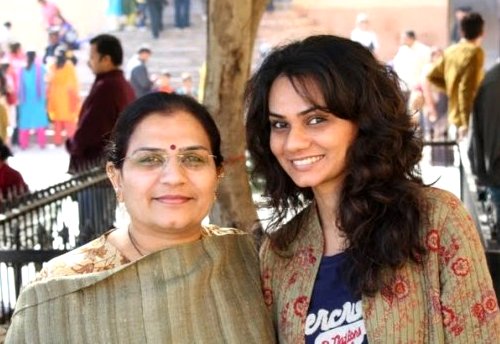
Tanvi with her mother
Tell us about when you got that call from A.R. Rahman and he invited you to work with him. What was your reaction?
I was in a complete state of shock. It was around midnight when he had called. So when you get a call like that in your sleep, you obviously don’t believe it. But then I thought I should go to the studio. I thought what could possibly happen? The security will throw me out, at the most. So I went and waited for an hour, and then he came down and said, “So, how are you?” And I was like, “You are in front of me. You are A.R. Rahman, and you are in front of me.” I needed someone to pinch me.
It’s difficult to change career paths after you have worked hard in a field. How did you really convince yourself that this is your calling and this is the path forward?
Let me say one thing for sure, nothing is easy. You have to work hard for everything. There are two sides to everything. Trust me, it wasn’t easy for me. It just looks like an easy ride, but you have to work your rear end off, to come to that level. I think for me, the fact that I got Rahman Sir to call me in my first shot made me feel like maybe, I do have it. When you have a rough diamond, you have to polish it and you have to cut it to make it shine bright. So I just took it upon myself. I had to do it.
However, I didn’t completely shift to music. I still have my design house that I handle on the side. When something comes so late for you in life, you can’t entirely depend on it. Music came to me in 2003, who would have thought? Even now my friends ask me, “Seriously. How the hell did you get into this?”
But I am a very spiritual person. When it is a divine thing for you, I don’t think you want to disrespect it. And by disrespecting, I mean, you have to practice. You want to get better, you want to be called a singer, you have to practice day in and day out. You can’t just take it for granted. Just because a big person has given you a chance, it doesn’t mean you’re going to keep getting it. It’s the same thing with art, right? You have to practice it. Not just art, but anything you do, you have to practice.
Tell us about some of the challenges you faced when you decided to take this route? How did you overcome them?
I faced a lot of challenges from every angle, including home. My parents didn’t like the fact that I was getting into music. There is a certain taboo associated with the film industry. All musicians work at night. So I used to come back at 4 am, sometimes 6 am, because we were working on background scores, multiple genres of music. For me to take up music and get into that work routine was a task. I had to spend time and my parents didn’t like the odd hours too much.
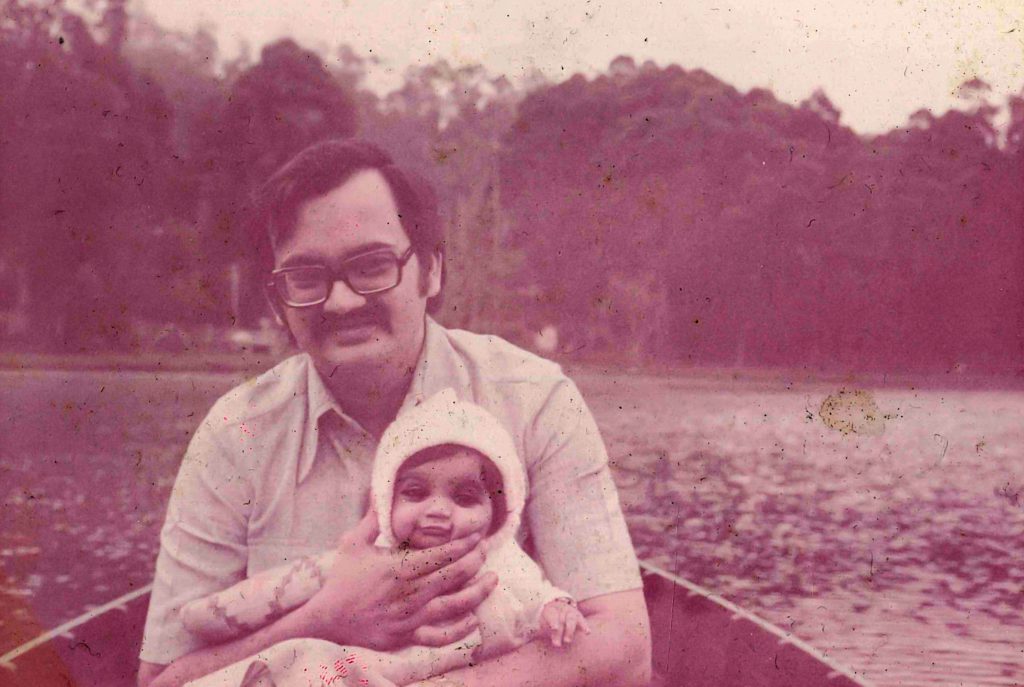
Tanvi with her dad
Not many people liked the fact that I could sing in multiple languages like Spanish, Portuguese, Arabic, etc. and with the correct pronunciation. I think that was also why a lot of these directors would call me to work on background scores. They felt that I could deliver. It was my forte to sing in different languages. So they used to come up with ideas like “Let’s try something in French”, or “I want this to sound German.” It opened different doors, not just for me, but for everyone. But I had to face the baseball bat. It’s not been an easy journey. I have worked really hard. And to balance my design business and music at the same time was quite a task.
Did you face any prejudices or stereotypes, being a woman in the music industry? Do you think the music industry can overcome sexism?
That’s a good question. I don’t want to think about these things, because once you start thinking about the outer things, your focus goes. And once that happens, you can’t accomplish much. I just go into the studio, finish my work, and get out. That is the rule I follow. I don’t listen to any chatter outside. I think it’s a personal choice to listen or ignore. People will have opinions. I can’t keep everyone happy. Some people will like me, some won’t.
At the end of the day, you have to be confident, strong and you have to fend for yourself. Because it is just you. You can ask for help. People might give you a shoulder, but ultimately, you have to decide what needs to be done and how you want to lead your life. These are my principles.
I too faced prejudices, people objected to me working late hours. I got a lot of it. The neighbors looking and talking was very common. At the same time, during the day, I had to make up with my office work. I had to balance both my music at night and my design work during the day. Of course I had my breakdowns. I am only human. But that’s part of life.
Are you parents completely comfortable now with you being in this field of work?
Yes, totally comfortable. After I won the Grammy, they told everyone, “She’s my daughter.” When they go outside, people recognize them as my parents. Now they’re proud of me.
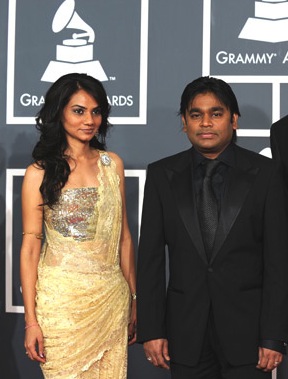
Tanvi at the Grammy Awards
Even when I was going through the rebellious phase in my life, when they told me to not do this, I made it very clear that I wanted to do this. I told them, “I have taken this up now. And If I start something, I like to finish it.” Now they’re happy. They understand the seriousness of it, and the kind of focus required for it. They respect my dedication, diligence and punctuality. So I have realized that it might take time, but if you put your heart into something, you will see results.
Tell us how life has changed after the Grammys for you, professionally
Professionally, you do get a lot of respect. Everyone wants to come and talk to you. People who had just written me off, changed. There were people who’d tell me, “You’ll always be a chorus singer, you will never come up in life” and I’d just say, “You know even chorus singers are good at what they do.” I used to face a lot of those type of comments earlier.
It took time, but I think I have done a pretty darn good job. After the Grammy, so many doors have opened for me. I feel that it’s a, beautiful blessing. Because of Spanish Jai Ho song, I got to attend the Latin Grammys. When the audience heard my Spanish song, they thought I’m Mexican. They immediately started talking to me in Spanish. But I couldn’t reply back in Spanish. But they were really happy that an Indian girl could sing without an accent, that too in Spanish. I think I should get a pat on my back for it!
But yes, it’s nice. The fact that a totally different community was welcoming me with open arms gives an amazing feeling. At the Latin Grammys, I was the only one in a saree. When I entered and they got to know I was the Spanish “Jai ho” singer and also co-wrote it, they gave me a huge welcome. It was very humbling to see so many happy faces. That moment was magical. I think the moment you manage to bring a smile on someone’s face, you’re doing it right.
While you were writing the Spanish lyrics for the song Jai Ho, do you remember any special behind the scene anecdotes that you can share with our readers?
I don’t specifically remember the writing part of it. I was just really shocked that I was sitting in front of Gulzar sir, and Rahman sir. I remember it was late at night and Rahman sir called me and said, “Come, come, we have got work.” Gulzar sahab was already sitting there. He said, “Go sing!” I said, “Okay okay. I will.” Then he said, “Think like Beyonce and sing like Shakira”. It’s very nice to work with him. He throws these challenges at you and it makes you feel like okay, let’s see what we can do. I tried my best. There was this one part where he said, “Let’s add something else. Probably a different language.” And that’s when we decided to add the Spanish part. He also wanted the Hindi part to have a little western touch, in terms of the pronunciation and the way we sang it. So yes, that’s how the song was made.
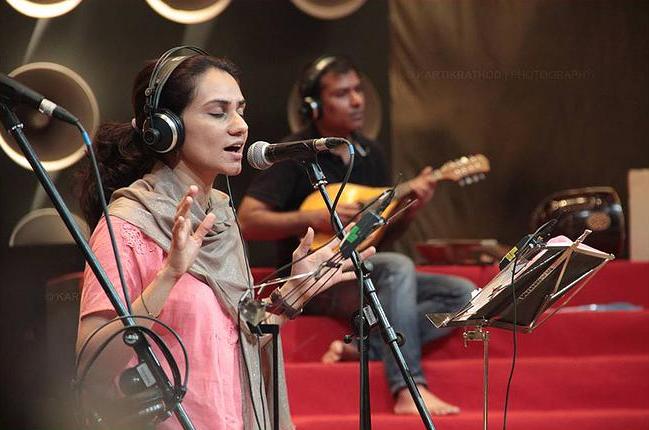
Tanvi Shah, Coke Studio MTV Season 3
How many languages do you sing in?
English, Hindi, Tamil, Malyalam, Telugu, Kannada. Then there’s Spanish, Portuguese, Arabic, Swahili, Afro Cuban. I also sing in Gujarati, Bengali and Bhojpuri. And of course Spanish has its own variants.
Even before you got into music as a career, were you able to sing in all these languages, or is this something that you picked up later on?
When I was in George Washington University, we had a lot of international students on campus. It was really nice because I got involved in a lot of the festivities. For some reason I always got pulled towards Latin and Arabic music. We also had this Egyptian friend, and a friend from Columbia. At the festivities everything ended with music and dancing. Living with them, I got used to the way they talked, and the way they pronounced. I think that’s how it all started.
And then of course, when you’re doing shows, you can’t fake the pronunciation completely. I spend around a week on one song when I am doing a show or a cover, so that I get the right pronunciation. I have a couple of friends who also help me with it. But I think now, it just flows, because for me it’s music.
Do you get nervous before a performance? How do you handle mistakes?
Oh hell yes! I am a total nervous wreck. I need to breathe deep and tell myself it’ll be fine. But once I am onstage, I don’t know what happens to me. It’s an alter ego that comes alive. Sometimes, I am so into the song, that I just repeat the chorus, or get a word or two wrong. But then I just smile and dance it off. But you see if there’s no mistake, then there’s no fun. I’d feel like something’s wrong.
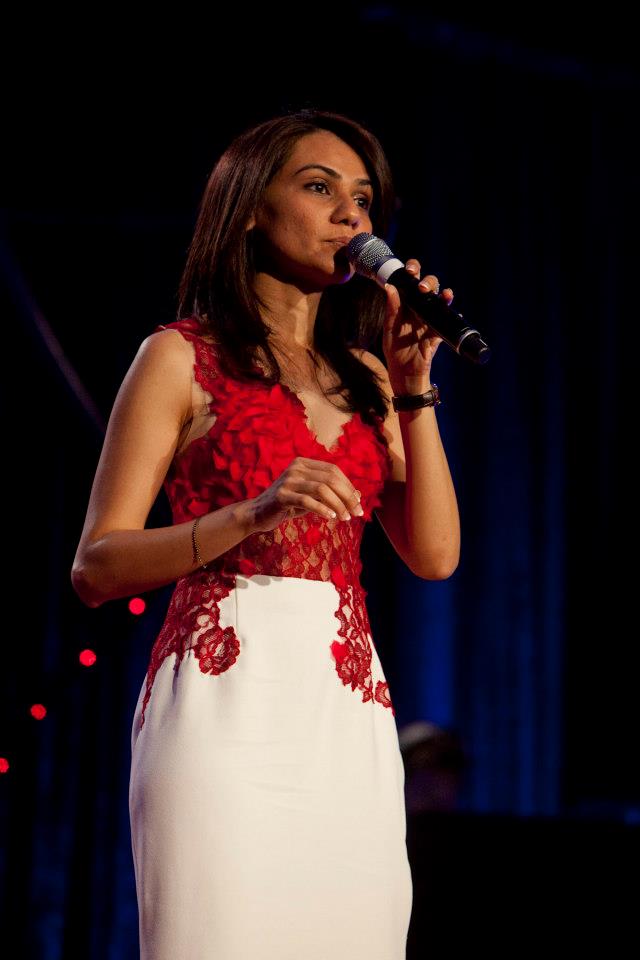
Tanvi at a performance
What advice would you give to future musicians?
If you have the dedication, diligence, discipline, and punctuality, I think you can achieve everything. You do have people who can help you. And when they help you, definitely listen to them. Focus is very important. And when someone’s giving you the wings and teaching you how to fly, let it sink in at every step. That is your groundwork, and your base.
Keep at it. Nothing in life comes easy. If you really want something, you have to go after it. To get there, you just have to figure out the path. You can’t jump steps. There are no shortcuts to success. For example, there are so many auditions that are happening. You have to go, stand in line and take the audition. You can’t just sit at home and think that because you’re talented, the chance will just come to you. At least walk 50% for the other side to walk 50%. I think that’s the basic rule for everything. Don’t disrespect the talent that you have. Sometimes I really wonder if people know that it’s a really big gift to be talented. So if you want to come up in life, you have got to make use of that gift.
Your music has helped calm children with autism. You have also been known to give back to the society. Can you tell us a little about how you’ve used your music for healing?
We just did this lullaby for fun. You know how you send something to a friend, and they forward it to someone, and then further. I was doing this show in Delhi, and a fan came backstage and told me he wanted to talk to me. He told me that his nephew was an autistic child, and he hadn’t slept in the last 2 or 3 years. But after listening to the lullaby, he slept every night. That was a big award for me. Imagine if I can do this for one kid, how many autistic kids there are in this world. And if our music does have healing powers, then why not use it? I don’t know how to prove it but yes, music can heal. This needs to be out there. There are so many kids who need help and who go through so much at the age of 4 and 5. They have done nothing to deserve it. Imagine, we don’t sleep one night and we get cranky. And this kid hadn’t slept in years.
Do you have any active projects in this direction?
No. I don’t have an active project as such. I donated a song of mine “Zindagi” to the End Polio campaign for the Rotary. I would love to do more. Unfortunately, not many artists are ready to do anything for free. All the profits earned from my designs go to the pediatric ward of the Cancer Institute.
I recently started surfing. I was inspired by the local fishermen. They’re actually really nice people, the most loyal people you will ever meet. You know how these stereotypes are. People think, “Oh my God! These fishermen, they only know how to kill and do drugs.” That’s not true at all. One of the fishermen is now helping his entire village. Some of these boys help me with my work, and they get paid for it. I have a whole new outlook to the way we live. I’d be lying if I said that I wasn’t one of those people who stereotyped. But I was completely wrong about it.
What is your idea of an empowered woman?
My idea of an empowered woman is one who is always growing. I think it’s a learning process and you discover it every day. In today’s world, we are equal to men. But you really have to be confident. You have to be aware about things. And for me, that’s empowerment. Being who you are wherever, and at the same time being happy and confident about yourself, is my definition of an empowered woman.
Sayfty’s mission is to Educate, Equip and Empower women so that they can protect themselves against violence. What is your message for our readers related to women’s personal safety and the issue of violence against women?
If you ask me, I am going to be extreme and say carry a taser with you. I carry a taser with me. Be aware of your surroundings. Now you have so many apps to keep yourself safe. The younger generation needs to take care of small things. You want a drink, buy a drink on your own. Don’t take it from someone you don’t know or trust. You have these politicians who just say absolute nonsense which is unbelievable. I don’t feel like reading the newspapers these days.
Bio
Tanvi Shah is an award-winning Recording Artist/ Songwriter and one of the most sought after voices in the music industry today. Tanvi shot to fame when she won the prestigious Grammy Award for Best Song Written for Motion Picture or Other Visual Media for her Spanish lyrics for the song “Jai Ho” from Slumdog Millionaire (2010), an award she shared with maestro A.R. Rahman and lyricist Gulzar. She is the first Indian woman to have won this coveted award. She also shares the World Soundtrack Award (2009) with Rahman and Gulzar besides receiving the BMI Award in 2009 in London for the same track.
Following this roaring success, Tanvi featured in Snoop Dogg’s song, “Snoop Dogg Millionaire”. While she has done her fair share of playback singing for the film industry in India, she is an international star. This versatile singer’s appeal lies in the fact that she can sing in several different languages, which has won her fans across the world.
Tanvi sings in Spanish, Portuguese, Afro-Cuban, Arabic besides Hindi, Tamil and Telugu and experiments with a wide range of music with her band. Her adaptability has been proven in her collaborative work with international music producers such as Jeremy Hawkins (USA), Che Pope (USA), David Batteau (USA), and DJ Salah of Germany.
Tanvi has walked the green carpet at the Latin Grammy in 2011 while promoting her song, “Lluvia Lejana”, with Gustavo Alarco, and recently shared the stage with Lebohang Morake, South African singer and composer, famous for arranging and performing the music for The Lion King movies and stage productions.
She firmly believes that we all need to give back to society. She is actively involved with the Cancer Institute and with the “End Polio” campaign of Rotary International along with Mr. Amitabh Bachchan, A.R.Rahman and Mr. Anil Kapoor. She has donated her song, “Zindagi”, produced by JHawk, to the End Polio campaign album that features international artistes such as Itzhak Perlman, David Sanborn, Ziggy Marley, Donovan and members of the Congolese band, Staff Benda Bilili.
Tanvi’s keenness to learn from experiences has led her to explore life in all its myriad colors. She is a talented jewelry designer, a vocation that has perhaps come naturally to her as the daughter of a gemologist mother. But she has not shrunk away from extending her creativity to other challenging areas. The starting point for these ventures remains music. It was Tanvi’s recording of the unplugged version of a song originally composed by Rahman, that got her noticed among care-givers and teachers dealing with children with “high anxiety” disorders. Global Health was the subject of her talk at a TEDx conference in San Francisco in November 2012 where she shared her thoughts together with pioneers in the field of technology, medicine, business and education on the subject, “7 billion well: Re-imagining global health”.
What keeps her going is Tanvi’s own take on life. She believes that “Life is too short for any kind of negativity, it is important to be true to yourself and stick to your roots”.

